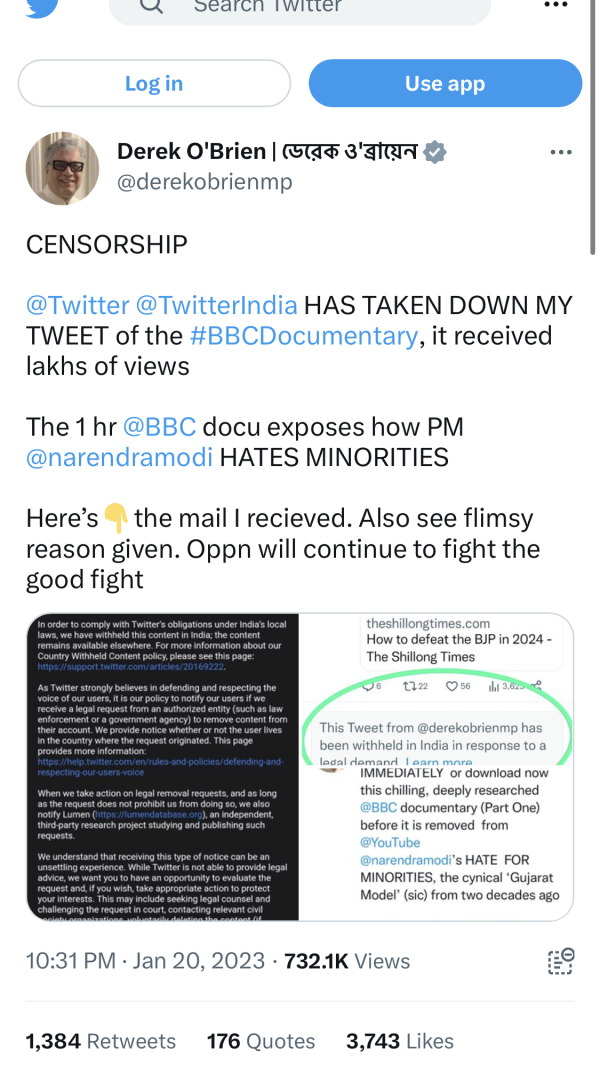
It’s been exactly six months since Elon Musk took over Twitter, promising a new era of free speech and independence from political bias. But Twitter’s self-reported data shows that, under Musk, the company has complied with hundreds more government orders for censorship or surveillance — especially in countries such as Turkey and India.
The figures are drawn from the Lumen database, a public clearinghouse for takedown requests and other government orders received by online speech platforms. Maintained by Harvard’s Berkman-Klein Center for Internet & Society, Lumen has collected government requests to online for more than 20 years with participation from Google, YouTube, Wikipedia and Reddit, among other platforms.
Twitter hasn’t published a transparency report since Musk took ownership, but the company has continued to make automated submissions to Lumen as part of its system for processing government requests. Lumen also collects data on content removed for defamation or intellectual property disputes, but for the purposes of this analysis, Rest of World focused solely on court orders and direct requests from government agencies.
Lumen’s data consists entirely of self-reporting by platforms, and there’s no legal requirement that the reports be complete. Nonetheless, the data is considered to be canonical within the industry, and outside surveys have largely confirmed its accuracy. “Historically, it seems Twitter has sent a copy of everything they’ve received to us,” says Adam Holland, who manages the project for the Berkman-Klein center. “My understanding is that they have a small team of people that work on this and it’s a largely automatic process.”
The biggest irregularity came earlier this month when Twitter’s self-reports abruptly stopped. After averaging over a hundred copyright claims a day, the flow of new reports halted on April 15th, and Twitter has not made a submission to the database in 12 days. Holland is still determining the cause of the halt and is unsure whether it’s the result of a technical issue or a deliberate choice by Twitter. “I would be saddened if it turned out they decided to stop sharing,” he says, “because a lot of really good research is being done.”
To put the data in context, Rest of World compared Lumen reports from Twitter’s Musk era (October 2022 to April 2023) against the previous two six-month spans. The results show government requests to Twitter more than doubling, from 348 to 971, when we compare Musk’s first six months to the same period a year earlier. There’s no similar increase in the number of resisted requests over that same period.
The rise in overall requests may have been driven by forces outside Twitter’s control. The bulk of the recent requests come from countries that have recently passed restrictive speech laws — most notably, India, Turkey, and the United Arab Emirates. Germany, which generated 255 requests, recently increased enforcement after revisions to a 2017 law prohibiting hate speech and extremism.
Under previous ownership, Twitter actively resisted requests from many of these same regimes. For two weeks in 2014, the platform was banned from Turkey, in part due to its refusal to globally block a post accusing a former government official of corruption. (The executive who led that charge was Vijaya Gadde, one of the first executives fired after Musk took over.) In July 2022, the company sued the Indian government over an order to restrict the visibility of specific tweets. After Musk’s takeover, however, Twitter complied with more than 100 block orders from the country, including those against journalists, foreign politicians, and the poet Rupi Kaur.
Twitter replied to Rest of World’s email with an automated emoji response; the company offered no further comment.
As part of the drastic reduction in Twitter’s employee count, Musk has decimated many of the departments that process government requests, which may have reduced the company’s ability to resist such orders. At the same time, Musk has made clear in interviews that his vision of free speech does not extend to legal requests.
“We can’t go beyond the laws of a country,” he said in a recent interview with the BBC. “If we have a choice of either our people go to prison or we comply with the laws, we’ll comply with the laws.”



